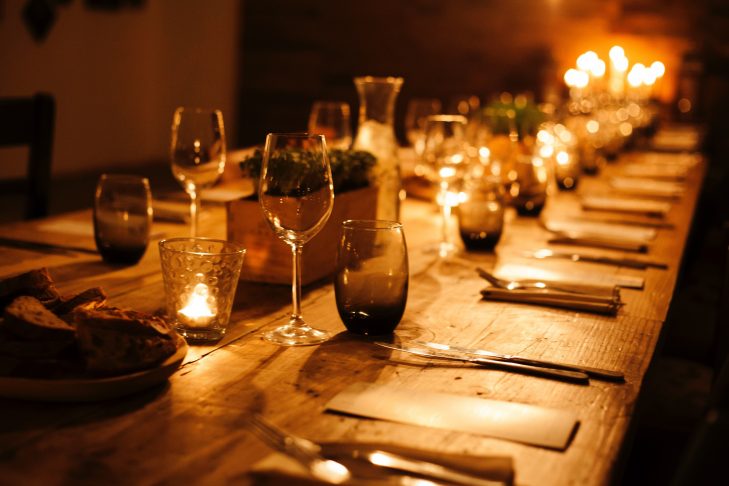Death Over Dinner Jewish Edition is an adaptation of the successful Death Over Dinner project founded by Michael Hebb. Hebb said in a recent article in The Atlantic that over 100,000 dinners in 30 countries have taken place since 2013. Francine Hermelin, Reboot director of programming, aims for similar success for the Jewish version within five years. The San Francisco-based Reboot is the same Jewish organization that sponsors 10Q, a series of 10 questions meant to make the High Holiday experience more meaningful.
Reboot has now taken on death, piloting Death Over Dinner Jewish Edition in Los Angeles. Hermelin described the Jewish edition as an experience that “facilitates live programming to address end-of-life matters over a meal with sensitive and challenging topics that are otherwise overlooked as being too difficult to discuss.” She further noted there is currently no other Jewish digital resource or online portal that considers topics related to end of life. “Our website,” she said, “represents a variety of Jewish voices and perspectives on this sensitive subject with aggregated content or facilitation of live programming.”
Hermelin recently spoke with JewishBoston about the project.
Why did Reboot take Death Over Dinner?
One of the many things we do at Reboot is offer an in-depth look at Jewish culture, milestones and rituals. Death is a lifecycle moment and a ritual moment, and we have distinct Jewish traditions for marking it. Over time, Michael Hebb became more interested in what Judaism had to say about death and dying. Reboot is also collaborating with Rabbi Sharon Brous at IKAR to create a library and provide resources. We want to activate individuals to have conversations about death and dying through a Jewish lens.
Why would millennials be interested in the topic of death?
Hebb saw there are related death movement happenings, such as death cafes, that have been popping up. Millennials want to have conversations around death and dying. When we can talk about these things more honestly, there is something very releasing. Everyone is touched by death in some way, and living is really a process of dying. Death Over Dinner initially catalyzed the conversation and found that people were ready to talk about it.
What are some of the features of Death Over Dinner Jewish Edition?
Like its secular counterpart, Death Over Dinner Jewish Edition breaks a taboo by allowing people to have a direct conversation about death. It also encourages people to take appropriate next steps that can include creating an ethical will or writing advance care directives. Some people might want to engage their family. For some, Death Over Dinner is an activity where you have tools for a meaningful conversation. It’s a trusted place where you’re sharing intimate things about yourself. One of the key pieces of the experience is that the person convening people at their dinner table creates that trusted space. The project gives you step-by-step guidelines to initiate a meaningful conversation. The dinner table can be a new portal of intimacy and communication.
Where does the project stand now?
There is a website, which is a significant tool to allow people to plan dinners. We just finished a two-year pilot in Los Angles with IKAR, one of our three partners on the project. We’re aiming for the program to be realized within more institutional and community settings. Our site is designed for individuals to download everything they need to create their own dinner experience. We know from our work with our community partners that other Jewish organizations could really benefit from this.
While IKAR piloted Death Over Dinner Jewish Edition within its community and the broader Los Angeles community, we’re working with teams in other cities that include San Francisco, New York and Chicago. There is a national outreach manager in place to coordinate the project. The goal is to activate as many communities as possible and transform the novice into a convener, all the while doing this through a Jewish lens.
What do you hope Death Over Dinner Jewish Edition will help people to accomplish?
We live with this taboo around dying. At the moment of death, Jews know exactly what to do. Death Over Dinner Jewish Edition facilitates conversations about last wishes or how we might want to die. We are acknowledging that life is finite, and that is a difficult reality for most people.
On the site, we begin with a choice of multiple intentions that are intended to be disarming. The intentions help customize the conversation you want to have at the table and enable you to prepare your guests with resources before the dinner.
There are nine categories to choose from, which include preparing for the end of life, as well as simply being curious about Jewish perspectives on death and afterlife. It can provide space and time for someone caring for someone who is dying and eager to have a conversation.
A Death Over Dinner conversation can also touch on things to help guests live more meaningfully. It can provide the opportunity to set up a legacy. There can be conversations about the financial responsibility of planning a funeral. Rabbis, theologians and mental health professionals have contributed a breadth of resources that is phenomenal. Being able to inaugurate these conversations about death and its related subjects are powerful tools for the Jewish community.



